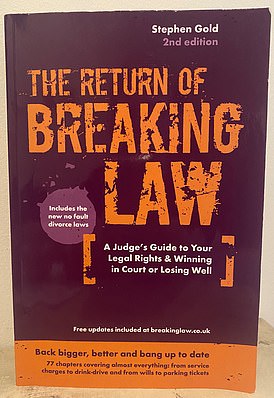
Stephen Gold: ‘Without prejudice’ will not work if you try and use it as a cover for improper remarks like ‘Refuse my offer and I’ll tell a pack of lies in court. I’m a better liar than you.’
Stephen Gold is a retired judge and author who has written popular series for This is Money on how to be a successful executor, writing a will, bankruptcy and consumer rights.
In part one of his new guide on the cost of taking legal action he explained court fees, in part two how to cut bills, and in part three mediation.
Today, he explores further strategies to reach a settlement.
In a civil case, someone will win, and someone will lose. In a family case, there are frequently no winners.
Although in a civil case the parties, or one of them, may have it in mind to compromise to some degree, they may feel it is strategically preferable to postpone investigating a settlement.
This could be until after a court case has been started and some of the procedural steps which would led up to a full trial – and there are quite a few – have been taken.
By then, possibly with helpful documents and even witness statements having been disclosed – the opposition may be getting cold feet. The strategy may be right.
But whenever a claim (or a defence to it) is put to the other side, it should be put as strongly as it can, without exaggeration for that can backfire.
If compensation is being sought which is not for a fixed amount laid down by law, it can be at the upper end of what would be an appropriate range so as to allow room for negotiation, although not inflated to some ridiculous level, for that too can backfire.
Ways to reach a settlement: Using protocols
Before a court case is ever started, the system sets a backdrop to negotiations which is calculated to lead to a settlement.
This is by way of the parties following what is called a ‘protocol’ which suits the particular category of claim.
There are 16 different protocols for 16 different categories. You will find them at the back of the Civil Procedure Rules 1998 once you have finished binging on your ‘Game of Thrones’ box set.
Among them are protocols for claims for housing repair, personal injury, negligence by professionals (though positively not ex-judges advising on This is Money and MailOnline), package travel, business and public authority debt and construction and engineering disputes.
Each protocol requires you to send your opponent a letter setting out specified details about what you are saying and asking for and requires your opponent to come back with a detailed response within a period which, depending on the protocol, can vary from between two weeks to three months.
If you fail to follow the protocol and sue away, you won’t get locked up, but a judge may halt your claim until you have done what you should have done, or you may end up having to pay the other side’s legal costs and expenses – or both.
Where your case is not covered by a protocol, similar principles apply, and you should write to the other side before suing and give them a reasonable time to respond.
How long is not cast in stone but guidelines say two weeks where the matter is straightforward and no more than 30 days in a very complex case.
Persuading the other side to settle: ‘Without prejudice’ letters
At the same time as you send off a protocol letter of claim or, even before then, you can have a stab at settling the dispute by dangling a carrot (it need not be organic) at the other side.
When you do so you should write ‘without prejudice’ at the top of the communication.
That way, the communication cannot be used against you in court if it does not lead to a settlement.
However, this protection will not work if you try and use it as a cover for improper remarks like ‘Refuse my offer and I’ll tell a pack of lies in court. I’m a better liar than you.’ Something like this may work.

Whenever a claim (or a defence to it) is put to the other side, it should be put as strongly as it can, without exaggeration for that can backfire
Dear Legal Department
WITHOUT PREJUDICE
Re Invoice B24/1796
I have separately provided you with full details of your firm’s breach of contract. If I am obliged to issue a county court claim against it, I will be seeking:
(a) damages for £XXX;
(b) interest on those damages at the rate of £8.00 per cent per annum from the date of the breach until judgment;
(c) all court fees payable by me including the hearing fee which will be generated for a contested hearing;
(d) travelling expenses and loss of earnings for myself and my witnesses for a contested hearing;
(e) an allowance at the rate of £19 per hour as a litigant in person for the time spent on the claim including time at court and getting there and back on the basis that by defending the claim your firm will have behaved unreasonably in all the circumstances of this case.
I would prefer not to have to go to court because I have better and more productive things to do with my time.
Nevertheless, I will have no compunction about suing your firm if that be necessary.
In a spirit of compromise and with a view to a prompt resolution to the matter, I am prepared to accept in full and final settlement of my claim the sum of £YYY OR I am prepared to forgo my claim for interest provided I receive from you the sum of £ZZZ within 14 days of the date of this communication.
This offer will lapse at the end of that period.
Yours faithfully
Clive Troublesore
In more substantial claims, it could be to your advantage to concentrate the other side’s mind on negotiating by making a written offer to them to settle your claim during a case – or even before it.
This is an offer under part 36 of the Civil Procedure Rules 1998 and I recommend you use the form fancily called the N242A to do this.
You will be offering to the other side specified terms on which you are prepared to settle.
If the offer is not accepted, details of it will be kept from the judge until after they have decided the case.
The consequences for the other side could be dire if the offer is not accepted, the case proceeds to a trial and the judge gives you what you were offering to accept or more.
They are likely to have to pay you an extra 10 per cent on any damages you are awarded with different percentages for a mega award of over half a million.
On top, you should all recover your costs from the other side along with interest on the damages and the costs.
Pitching an offer at the right level is an art and legal advice on it is recommended.
Turn to an Ombudsman
There is an ombudsman for almost everything although they haven’t got round to appointing a toilet brush manufacturers’ ombudsman yet.
Among those most heavily in demand are ombudsmen for financial services, legal services, housing and – most recently appearing – for new homes.
Each ombudsman’s service will usually decide on a complaint on the paperwork which is put forward by each side and so there is no opportunity to tear the opposition to shreds in the witness box.
The service will be free and so a useful alternative to court proceedings in lower value disputes – although the housing ombudsman who deals primarily with complaints against social landlords has been issuing some really sizeable compensation awards in the last few weeks.
And if you disagree with the ombudsman’s decision then you can always reject it and make a court claim.
Some links in this article may be affiliate links. If you click on them we may earn a small commission. That helps us fund This Is Money, and keep it free to use. We do not write articles to promote products. We do not allow any commercial relationship to affect our editorial independence.











